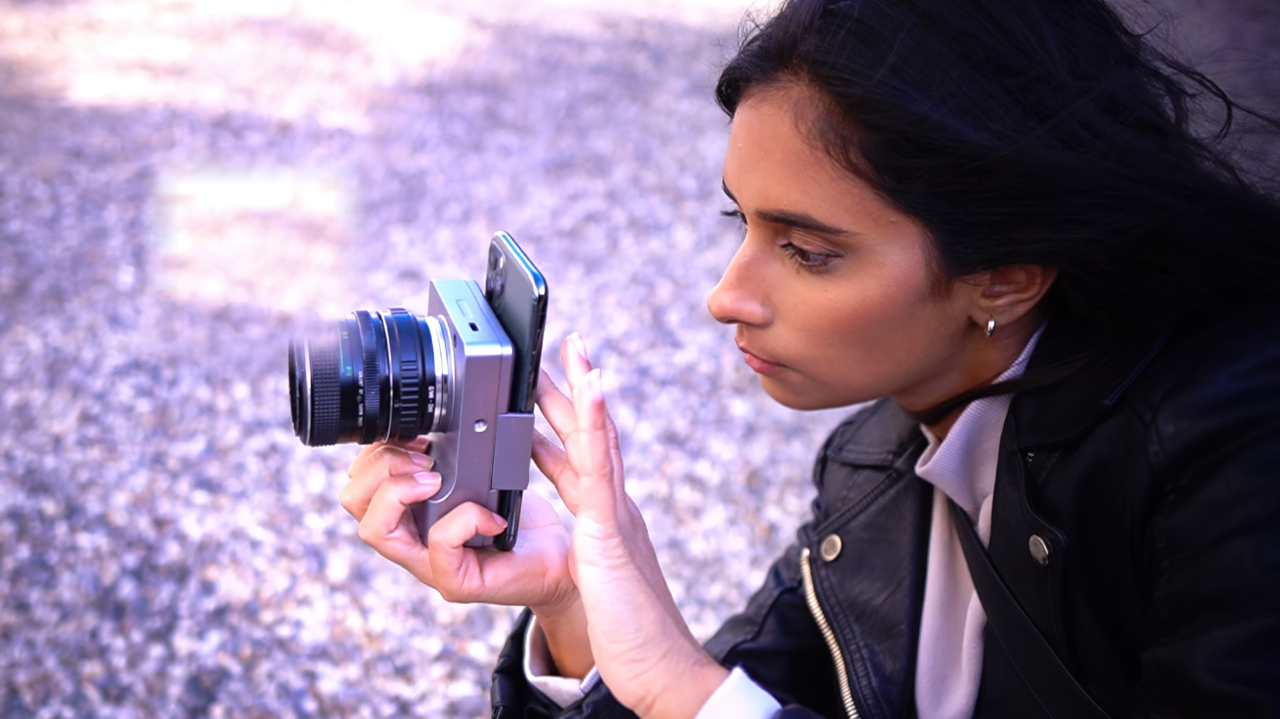Thanks to smartphones you can now point, click, and share your way to superstardom.
Smartphones have made creating — and consuming — digital photos and video on social media a pastime for billions. But the content those phones can create can’t compare to the quality of those made with a good camera.
British entrepreneur Vishal Kumar’s startup Photogram wants to combine the benefits of mirrorless cameras — replete with interchangeable lenses, big sensors, and often complex, fiddly controls — with the smarts and connectivity of your smartphone.
The Alice Camera, due for release in October for around $760 to early backers on crowdfunding platform Indiegogo, is, first of all, a compact, mirrorless camera.
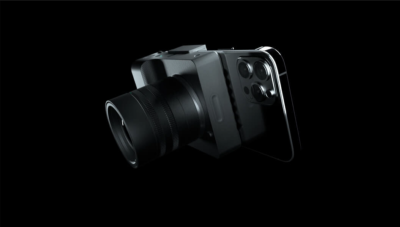
But its machined aluminum body is sleeker than other mirrorless cameras. There’s no onboard screen or viewfinder of any kind — just a shutter button, a control wheel and a cold-shoe adapter.
Instead, photographers mount their smartphone to the Alice camera. Alice focuses on what smartphones can’t do: it houses a big, light-soaking sensor, and it can be screwed to a wide array of lenses.
Alice links to your smartphone via a 5Ghz Wi-Fi connection — so your smartphone can do what traditional cameras can’t do. An app on your phone provides not just an easily updatable software interface on the smartphone’s big, bright screen, but the connectivity to easily share images and stream video.
The secret ingredient: an AI built using NVIDIA GPU-accelerated deep learning to help photographers wring the most out of Alice’s hardware.
A Star Is Born
Kumar, whose startup is part of NVIDIA Inception, an acceleration program that offers go-to-market support, expertise and technology for AI, data science and HPC startups, sees the opportunity for this device literally staring everyone in the face.
There are more than 1 billion active Instagram users, more than 1 billion active TikTok users, and more than 2.3 billion YouTube users. Social media influencers who can deliver great content to all these users become instantaneous global superstars, Kumar explains.
Consider Charli D’Amelio, who has more than 115 million followers, or Addison Rae, with more than 86 million, or YouTube star Mr. Beast, with more than 71 million followers.
Content creators like these may rely, in large part, on smartphone users to provide an audience. Most, however, left their smartphones behind long ago, adopting more sophisticated gear to create their content.
Firsthand Frustration
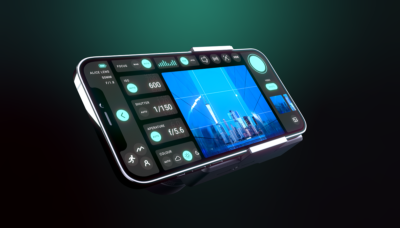
Kumar, a self-described cultural data scientist, learned this firsthand working as a data scientist at Sotheby’s. Great photography was vital to sparking worldwide interest in the auction house’s offerings on social media.
“I was thinking a lot about how data science and machine learning and artificial intelligence could be applied to create video and imagery,” Kumar says. “I was using a camera all the time to create video content and becoming increasingly frustrated with operating them.”
A Camera for Creators
And, for serious content creators, a better camera than the smartphone they already carry around with them is definitely needed.
In part, that’s because you can only capture so much light in the relatively compact sensors crammed into today’s smartphones, Kumar explains. Bigger sensors soak up more light, so they can capture a high-quality image even in very dim lighting conditions, among other benefits.
So Alice is built around a Sony IMX294 10.7 megapixel 4/3 sensor optimized for high-quality and full-width 4K video. The sensor is eight times bigger than that of a typical smartphone.
In front of that big sensor is a Micro Four Third lens mount. The compact interchangeable lens system gives users access to more than 100 lens options from Olympus, Panasonic, and specialty lens makers such as Sigma, Tamron, and Tokina.
Users will be able to choose from 16mm-equivalent fish-eye lenses for a super-wide angle of view or 800mm-equivalent telephone zoom lenses able to get clear, undistorted pictures of objects far away, with plenty of options in between.
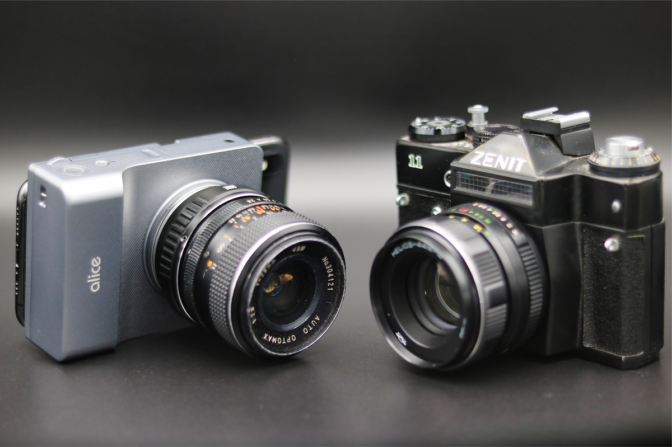
A Classic Deep Learning Problem
All of this is why professional photographers continue to keep big big, expensive cameras in their toolkit. But the masses of content creators may never get the most out of dedicated cameras, Kumar explains.
Making more expertise more accessible to more people is a classic deep learning problem. And the technology’s roots in computer vision and image recognition make training an AI to operate a camera a natural fit.
To build Alice’s AI, Photogram CTO Liam Donovan trained an NVIDIA GPU-accelerated convolutional neural network using millions of out-of-focus and in-focus images, teaching an AI to distinguish between good and bad photos.
Optimized for What You Do
The AI is a crucial element in the end-to-end deep learning image processing pipeline Photogram’s team has built.
The result is an AI that can control and improve focusing, change exposure and automatically adjust white balance, and even perform automatic image stabilization.
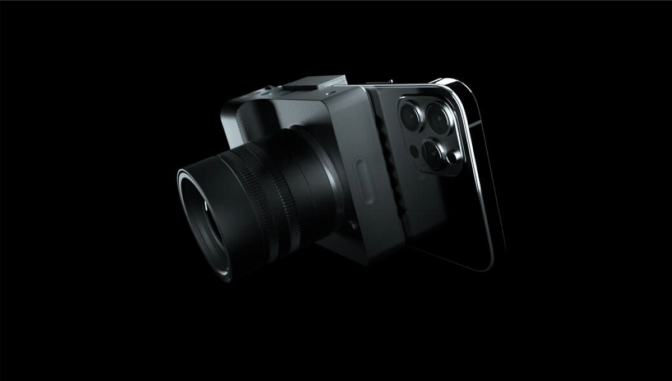
Users will eventually make Alice better at whatever photography they do, Kumar explains.
“Let’s say you’re a wedding photographer, or you like to shoot cats or clothes,” Kumar says. “We want people to be able to optimize our models and retrain them so their Alice camera can be more optimized for the photography they do.”
Smartphone Synergy
Revealed last September and positioned by Kumar as the “AI camera for creators,” in February the project has raised $200,000 from more than 250 backers — 7x Kumar’s original goal.
To be sure, like all early-stage crowded-funded projects, Alice is still very much a work in progress. The plan, for now, is to offer Alice to early funders on Indiegogo first and to the general public later.
However Alice is received, at first, with billions around the world creating and sharing images every day, sooner or later the idea is bound to click.
Image credits: Photogram
